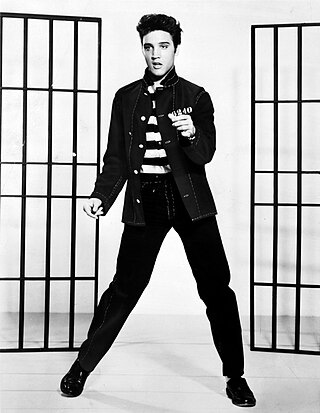
Elvis Aaron Presley, known mononymously as Elvis, was an American singer and actor. Known as the "King of Rock and Roll", he is regarded as one of the most significant cultural figures of the 20th century. Presley's energized interpretations of songs and sexually provocative performance style, combined with a singularly potent mix of influences across color lines during a transformative era in race relations, brought both great success and initial controversy.

"Heartbreak Hotel" is a song recorded by American singer Elvis Presley. It was released as a single on January 27, 1956, Presley's first on his new record label RCA Victor. It was written by Mae Boren Axton and Tommy Durden, with credit being given also to Presley. A newspaper article about the suicide of a lonely man who jumped from a hotel window inspired the song. Axton presented the song to Presley in November 1955 at a country music convention in Nashville. Presley recorded it on January 10, 1956, in a session with his band, the Blue Moon Boys, the guitarist Chet Atkins and the pianist Floyd Cramer. "Heartbreak Hotel" comprises an eight-bar blues progression, with heavy reverberation throughout the track, to imitate the character of Presley's Sun recordings.

Jailhouse Rock is a 1957 American musical drama film directed by Richard Thorpe and starring Elvis Presley, Judy Tyler, Mickey Shaughnessy, Vaughn Taylor and Jennifer Holden. Adapted by Guy Trosper from a story written by Nedrick Young, the film tells the story of Vince Everett (Presley), a convict who learns the guitar while in prison and later becomes a star following his release.

Winfield Scott Moore III was an American guitarist who formed The Blue Moon Boys in 1954, Elvis Presley's backing band. He was studio and touring guitarist for Presley between 1954 and 1968.

Priscilla Ann Presley is an American businesswoman and actress. She is the ex-wife of American singer Elvis Presley, as well as the cofounder and former chairperson of Elvis Presley Enterprises (EPE), the company that turned Graceland into one of the top tourist attractions in the United States. In her acting career, Presley costarred with Leslie Nielsen in the Naked Gun film trilogy and played Jenna Wade on the long-running television series Dallas.
Flaming Star is a 1960 American Western film starring Elvis Presley, Barbara Eden, and Steve Forrest, based on the book Flaming Lance (1958) by Clair Huffaker. Critics agreed that Presley gave one of his better acting performances as the mixed-blood "Pacer Burton", a dramatic role. The film was directed by Don Siegel and had a working title of Black Star.

King Creole is a 1958 American musical drama film directed by Michael Curtiz and based on the 1952 novel A Stone for Danny Fisher by Harold Robbins. Produced by Hal B. Wallis, the film stars Elvis Presley, Carolyn Jones, Walter Matthau, Dolores Hart, Dean Jagger, Vic Morrow, Liliane Montevecchi and Paul Stewart, and it follows a nineteen-year-old (Presley) who gets mixed up with crooks and involved with two women.

Elvis Presley was an American entertainer who achieved great initial success as a singer and stage performer. He publicly expressed an early career goal of following in the footsteps of his role models James Dean and Marlon Brando to become a top dramatic actor. His manager Colonel Tom Parker's persistent lobbying of William Morris Agency president Abe Lastfogel for a Presley screen test paid off on March 26, 1956, when the singer auditioned at Paramount for a supporting role in The Rainmaker. Although not chosen for the part, he signed a contract with Paramount producer Hal Wallis on April 25 that also allowed him to make films with other studios.

Loving You is a 1957 American musical drama film directed by Hal Kanter and starring Elvis Presley, Lizabeth Scott, and Wendell Corey. The film was Presley's first major starring role, following his debut in a supporting role in the 1956 film Love Me Tender. The film follows a delivery man who is discovered by a music publicist and a country–western musician who wants to promote the talented newcomer.
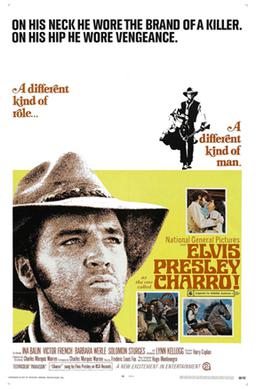
Charro! is a 1969 American Western film starring Elvis Presley, shot on location at Apacheland Movie Ranch and Old Tucson Studios in Arizona. This was Presley's only film in which he did not sing on-screen; the film featured no songs at all other than the main title theme, which was played over the opening credits. It was also the only movie in which Presley wore a beard. The film was novelized by Harry Whittington.

Richard Egan was an American actor. After beginning his career in 1949, he subsequently won a Golden Globe Award for his performances in the films The Glory Brigade (1953) and The Kid from Left Field (1953). He went on to star in many films such as Underwater! (1955), Seven Cities of Gold (1955), The Revolt of Mamie Stover (1956), Love Me Tender (1956), Tension at Table Rock (1956), A Summer Place (1959), Esther and the King (1960) and The 300 Spartans (1962).
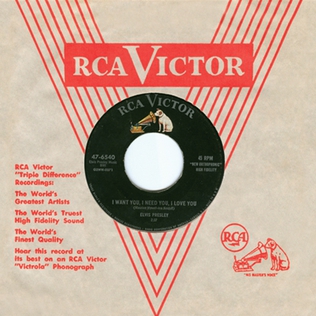
"I Want You, I Need You, I Love You" is a song written by Maurice Mysels and Ira Kosloff. It is best known for being Elvis Presley's seventh single release on the RCA Victor label, produced by Steve Sholes. It was released in May 1956, becoming Presley's second number 1 single on the country music charts, and peaking at number 3 on the US Billboard Top 100 chart, an earlier version of the U.S. Billboard Hot 100. Before the establishment of the Billboard Hot 100 chart in 1958, there were a number of charts including Jukebox plays, Store charts, and Airplay charts; the song reached number 1 on the Billboard Top Sellers in Stores chart.
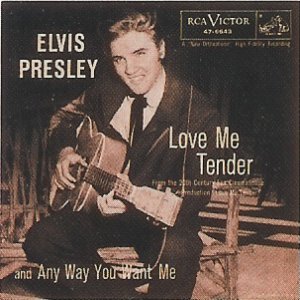
"Love Me Tender" is a 1956 ballad song recorded by Elvis Presley and published by "Elvis Presley Music" from the 20th Century Fox film of the same name. Lyrics are credited to "Vera Matson". The melody is identical to the sentimental Civil War ballad "Aura Lea" and therefore credited to Aura Lea's composer, the Englishman George R. Poulton. The RCA Victor recording by Elvis Presley was No. 1 on both the Billboard and Cashbox charts in 1956.

Elvis is the second studio album by American rock and roll singer Elvis Presley, released by RCA Victor on October 19, 1956 in mono. Recording sessions took place on September 1, September 2, and September 3 at Radio Recorders in Hollywood, with one track left over from the sessions for Presley's debut album at the RCA Victor recording studios on January 30 in New York. It spent four weeks at #1 on the Billboard Top Pop Albums chart that year, making Presley the first recording artist to have both albums go straight to number one in the same year. It would go on to spend 5 weeks at #1 in total. It was certified Gold on February 17, 1960, and Platinum on August 10, 2011, by the Recording Industry Association of America.

Elvis Is Back! is the fourth studio album by American singer Elvis Presley, released on April 8, 1960 by RCA Victor. It was Presley's first album of new material since 1958's King Creole soundtrack, as well as his first to be recorded and released in stereophonic sound. The album marked Presley's return to music after his discharge from the U.S. Army.

Elvis Presley had many close relationships throughout his career. The strongest of all his personal relationships, by far, was that he had with his mother Gladys, as described below.
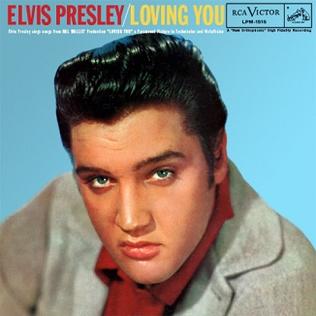
Loving You is the first soundtrack album by American rock and roll singer Elvis Presley. It was released by RCA Victor in mono, LPM 1515, in June 1957 to accompany his film, Loving You (1957). Recording sessions took place on January 15, 16, 17, and 18, 1957, at the Paramount Pictures Scoring Stage, and on January 12, 13, 19, and February 23 and 24, 1957, at Radio Recorders in Hollywood. These are the first sessions where Steve Sholes is officially listed as producer. It spent ten weeks at No. 1 on the Billboard Top Pop Albums chart. It was certified Gold on April 9, 1968 by the Recording Industry Association of America.

"We're Gonna Move" is a song by Elvis Presley. The song is credited to Elvis Presley and Vera Matson, the wife of Ken Darby, the principal writer, published by Elvis Presley Music. The song was featured in the 20th Century Fox movie Love Me Tender and was released as an RCA Victor EP in 1956.

"Let Me" is a 1956 song by Elvis Presley. The song is credited to Elvis Presley and Vera Matson, the wife of Ken Darby, the principal writer, published by Elvis Presley Music. The song was featured in the 20th Century Fox movie Love Me Tender and was released as an RCA Victor EP in 1956.
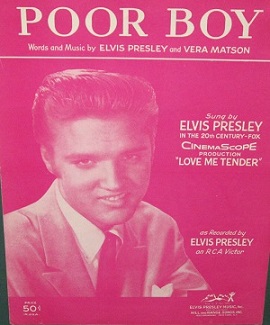
"Poor Boy" is a song by Elvis Presley. The song is credited to Elvis Presley and Vera Matson, the wife of Ken Darby, the principal writer, published by Elvis Presley Music. The song was featured in the 20th Century Fox movie Love Me Tender and was released as an RCA Victor EP in 1956.



















